Looking for Microneedling in Windsor?
You've found the right place. We offer advanced microneedling using Procell's microchanneling technology — a newer, more precise method that delivers superior results with less downtime than traditional microneedling.
What's the difference? Traditional microneedling uses rolling or dragging needles. Microchanneling uses a precision stamping technique that creates uniform vertical channels without tearing tissue, paired with medical-grade growth-factor serums for enhanced collagen induction.
Think of it as "microneedling 2.0" — proven science with refined technique and superior serums for better, more predictable outcomes.
Researching PRP or Vampire Facials in Windsor?
We offer a superior alternative. While PRP (platelet-rich plasma) treatments require a blood draw and processing, our Procell microchanneling uses medical-grade, lab-formulated growth-factor serums that deliver consistent results without needles, blood draws, or variable potency.
Why clients choose Procell over PRP: No blood draw, consistent dosing (not affected by age or health), faster procedure, and comparable or better outcomes based on clinical research. Read our detailed comparison →
Microneedling, Microchanneling & Collagen Induction Therapy in Windsor, Ontario
At Hideaway Spa, our Procell Microchanneling treatment — an advanced evolution of traditional microneedling that uses a precise stamping method rather than dragging needles — pairs precision microchannels with professionally formulated growth-factor serums to stimulate collagen, improve texture, reduce acne and surgical scarring, and refine skin tone — typically with less downtime than traditional approaches. 2
What is Procell Microchanneling? (short version)
Procell microchanneling is a safe, in-clinic collagen induction treatment that creates tiny, controlled channels in the skin and then applies medical-grade growth-factor serums directly into those channels. The channels trigger natural healing (collagen and elastin production) while the serums provide extra biological signals to rebuild more effectively. 1
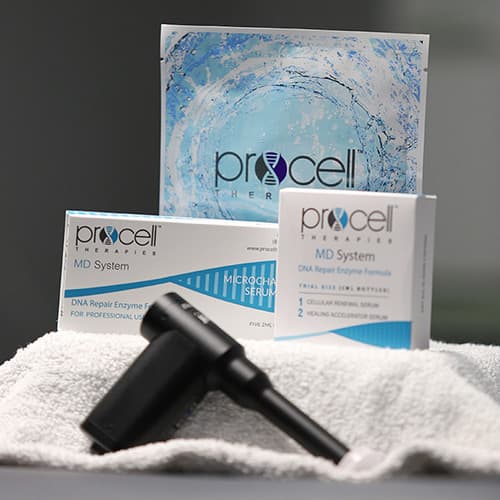
⭐⭐⭐⭐⭐ Rated 5.0 on Google (20 Reviews)
Read all reviews on Google →
"I have been going to hideaway spa for years and it is fantastic! Excellent service and the facials are amazing!!"
— Stephanie.
"Hideaway spa is a hidden gem.. ..very professional and knowledgeable. I look forward to going everytime. So many great services she provides"
— Trich H.
"Hideaway Spa is the place to go for high quality spa services and products. ..Her skin treatments are high quality. And everything is clean and hygienic. She cares about giving great service to her clients."
— Laura P.
Microchanneling vs Microneedling — Understanding the Difference
Both microchanneling and microneedling are forms of collagen induction therapy that create controlled micro-injuries to stimulate your skin's natural repair processes. The key differences lie in technique, precision, and the integration of medical-grade serums.
Technique
Microchanneling uses a stamping or linear approach to make uniform vertical channels; pen/roller microneedling can drag or shear tissue which may increase lateral trauma. This is part of why microchanneling often shows quicker visible recovery. 2
Downtime
Immediate redness is normal with both techniques; many microchanneling clients report noticeable reduction in visible redness within a few hours, and most report only mild tenderness for 24–48 hours. Strict sun protection and the provided aftercare support optimal healing. 6
Serum Delivery
The channels created during treatment improve absorption of high-value topical growth factors and peptides compared with topical products applied to intact skin. Pairing micro-injury with formulated growth factors amplifies the regenerative signalling pathways triggered by collagen induction therapies. 3
Best For
Fine lines, texture, post-inflammatory and surgical scars, pigmentation, and many forms of thin-surface scarring. Deeper volume loss or severe laxity may need adjunctive or medical-grade treatments. 2
PRP Alternative
Delivers growth factors similar to PRP (vampire facials) but uses standardized, medical-grade serums instead of autologous blood products. No blood draw required, consistent potency, and faster procedure with comparable or superior results.
Watch: Microchanneling vs Traditional Microneedling
Video courtesy of Procell Therapies
What Microneedling & Microchanneling Can Treat
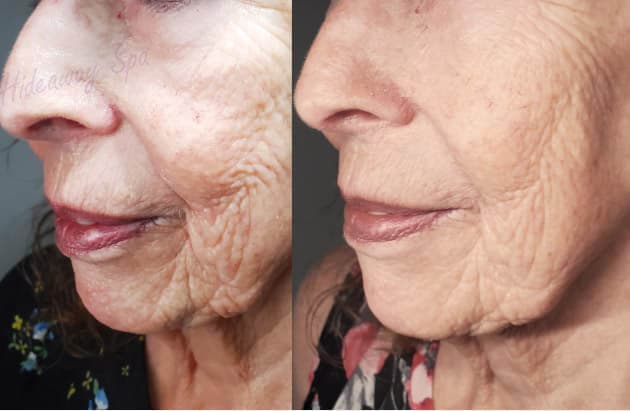
Fine Lines & Wrinkles
Stimulates collagen deposition over weeks for improved tone and decreased lines. Repeated sessions encourage matrix remodelling and firmer skin over months. 2
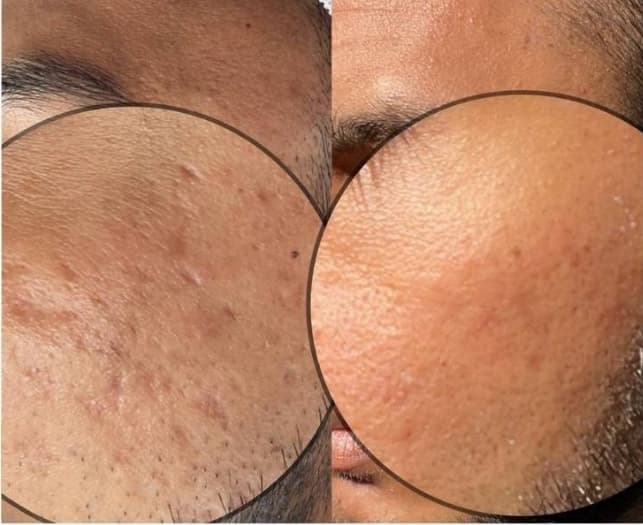
Acne Scarring & Texture
Atrophic acne scars remodel with repeated treatments; literature supports needling-based therapies for scar improvement, particularly when combined with targeted serums. Some deep pitted scars may be too deep for microchanneling alone — in those cases we offer thermolysis as an alternative or complementary option.
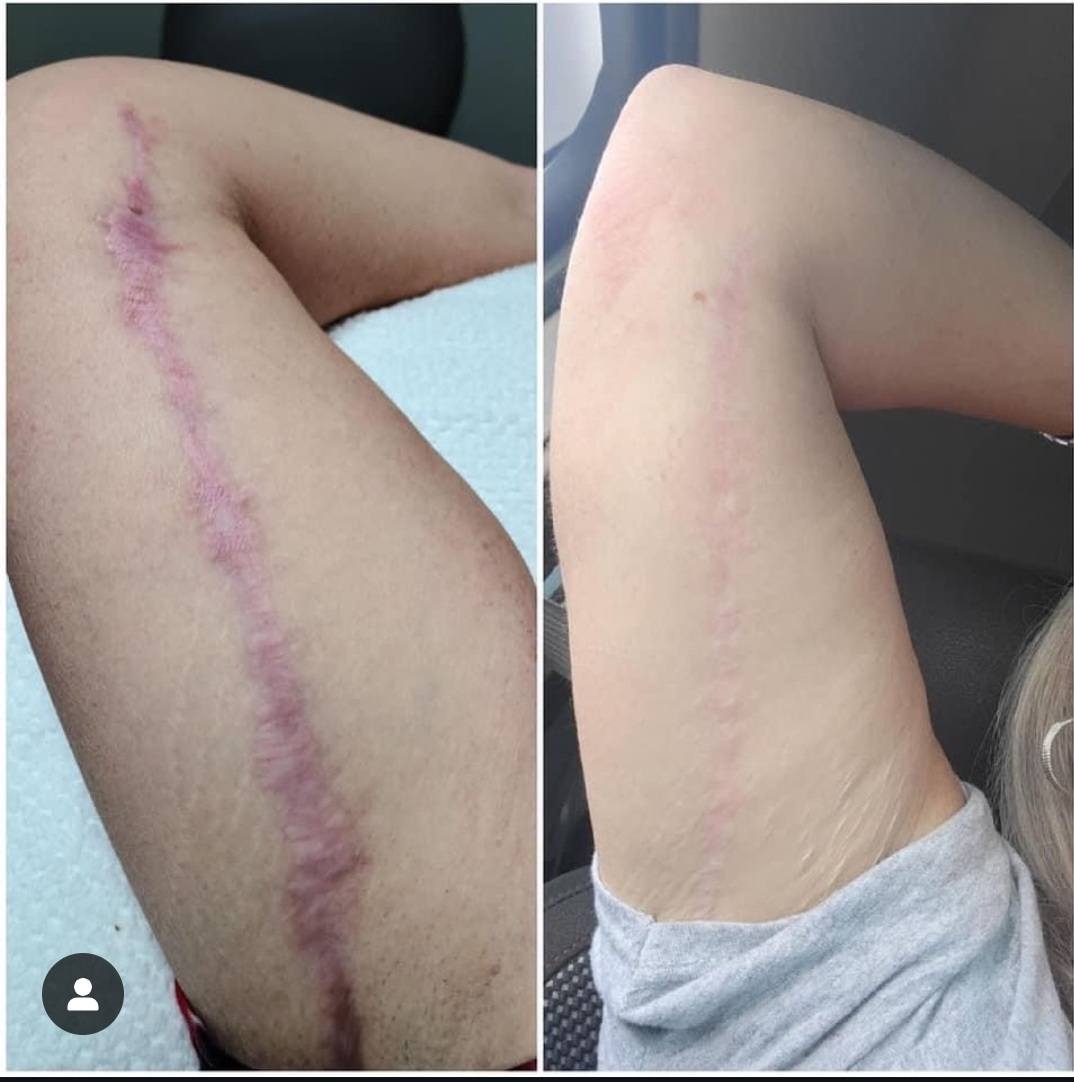
Surgical & Traumatic Scars
Surgical and linear scars commonly respond very well to precision microchanneling when treated in a series — especially when the microchannels are used to deliver growth-factor serums that encourage dermal remodelling. We recommend reviewing your specific scar photos during consultation.
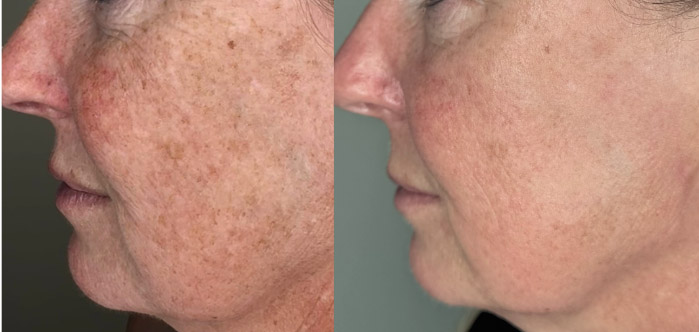
Pigmentation & Sun Damage
Improves tone by supporting controlled epidermal turnover and enabling deeper delivery of brightening actives in professional serums. Pairing with tailored homecare limits recurrence and supports long-term results. 3
Hair Restoration (on request)
Microchanneling can assist certain hair restoration protocols when paired with appropriate growth-factor serums. As we primarily deal with skin conditions, at this time we do not typically stock hair-serum formulations. If you are interested, you may contact us and discuss placing an order for a treatment.
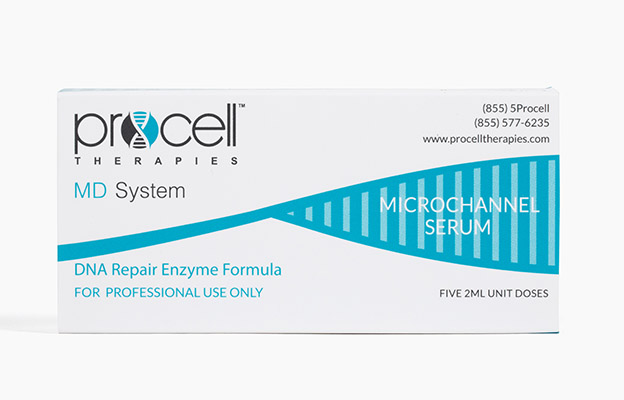
Procell MD Serums — clinically engineered, stem cell–derived growth factor delivery
Procell MD serums are medical-grade formulations featuring growth factors derived from lab-cultured human stem cells, combined with peptides, humectants and antioxidants. Delivered directly through the microchannels created during treatment, they provide targeted biological signals and hydration — helping the skin repair more effectively with smoother, brighter and firmer results, often with less downtime.
- Maximizes results — delivers actives precisely where the skin can absorb and use them most.
- Boosts renewal — stem cell–derived growth factors and peptides support collagen and elastin production.
- Refines texture & scars — visibly improves acne marks, surgical scars and skin tone irregularities.
- Calms & hydrates — hyaluronic acid, humectants and soothing botanicals reduce visible recovery time.
Key ingredient groups: stem cell–derived growth factors & peptides; hyaluronic acid and humectants; antioxidants & vitamins; calming botanicals and anti-inflammatories.
Best for: clients seeking clinically advanced improvement in scarring, tone, fine lines, and overall skin quality.
Applied immediately during your Procell treatment for superior absorption — your esthetician will select the ideal Procell MD serum blend for your skin.
Show Microchanneling Serum Ingredients & Science
Our professional microchanneling serum is formulated with advanced growth factors, peptides, and hydrating agents to maximize results during your treatment. Each ingredient is selected to support regeneration, collagen production, and skin health.
- Water (Aqua): Base solvent for hydration and ingredient stability.
- Benzyl Alcohol & Phenoxyethanol: Gentle preservatives to ensure formula safety and stability.
- Dehydroacetic Acid & Sorbic Acid: Mild preservatives, protecting against microbial growth.
- Hyaluronic Acid: Deeply hydrating humectant that helps maintain moisture in the microchannels and supports plump, smooth skin. Holds up to 1000x its weight in water.
- Silanetriol: Supports collagen formation and strengthens skin structure by providing bioavailable silicon.
- Butylene Glycol & Pentylene Glycol: Humectants that enhance hydration and improve penetration of active ingredients.
- Citric Acid & Sodium Phosphate: pH stabilizers to maintain serum effectiveness and skin compatibility.
- Plankton Extract: Nutrient-rich marine extract providing antioxidant support and skin revitalization.
- Lecithin: Acts as a natural delivery system to help growth factors penetrate skin layers more effectively.
- Arabidopsis Thaliana Extract: Plant-derived extract that provides antioxidant and anti-aging benefits, helps protect DNA.
- Micrococcus Lysate: Supports skin defense mechanisms and cellular renewal, provides DNA repair enzymes.
- 1,2-Hexanediol: Mild preservative and solvent, supports formula stability.
- Polyquaternium-10: Adds smooth texture and improves skin feel after application.
- Growth Factors & Peptides: Powerful regenerative molecules that mimic natural wound healing and collagen signaling:
- bFGF (sh-Polypeptide-1) & aFGF (sh-Polypeptide-11): Basic and acidic fibroblast growth factors that stimulate fibroblast activity and dermal regeneration.
- IGF1 & IGF2 (sh-Oligopeptide-2 / sh-Polypeptide-31): Insulin-like growth factors that promote tissue repair, collagen production, and skin metabolism.
- FGF10: Fibroblast growth factor that encourages keratinocyte growth for epidermal repair.
- TGF-beta3: Transforming growth factor that reduces scarring and guides proper collagen formation.
- PDGF (CG-PDGF): Platelet-derived growth factor that supports fibroblast proliferation and angiogenesis (new blood vessel formation).
- KGF: Keratinocyte growth factor that stimulates epidermal renewal and wound healing.
- HGF: Hepatocyte growth factor that promotes tissue regeneration and helps balance pigmentation.
- Mini EGF (Acetyl Octapeptide-17 Amide): Small molecule peptide that enhances cell renewal and skin thickness.
This serum is applied during microchanneling to maximize penetration through the temporary microchannels, providing immediate regenerative support, hydration, and collagen signaling for optimal results.
Note: For best results, follow your professional microchanneling protocol and aftercare instructions.
How Procell Microchanneling Works — user-friendly science
Controlled micro-channels trigger a wound-healing cascade — platelet activation, growth-factor signalling, fibroblast proliferation and new collagen/elastin deposition. Where Procell stands apart is the simultaneous, standardized application of formulated growth-factor serums (clinically designed blends) directly into those freshly created channels — providing biologic cues that complement the mechanical induction. This results in synergistic regeneration, rather than simply "creating holes" and waiting for the skin to do everything itself. 6
Technical deep-dive (expanded)
Histologic & cellular response
Controlled micro-injuries produce an inflammation → proliferation → remodelling cascade. Histology after collagen induction therapies shows increased dermal thickness, fibroblast activity and new collagen deposition over weeks to months — the basis for long-term texture improvement. 2
Growth factors & topical serums
Procell serums are formulated blends of growth factors, peptides and anti-inflammatory components intended to accelerate the proliferation & remodelling phase when placed directly into microchannels. Using the full bottle per treatment ensures a consistent therapeutic dose is available to the skin during the most biologically active window. The immediate application of a hyaluronic-acid sheet mask after treatment provides intensive hydration that supports barrier repair while proteins and peptides signal dermal remodelling. Additional take-home serums extend the effect for 10–14 days. 3
Micro-channel pharmacokinetics
Experimental microchannel and dissolving microneedle research shows labelled molecules penetrate deeper and at higher local concentrations when delivered through microchannels compared with topical application alone. This enhanced local concentration helps explain why paired clinical protocols often show better outcomes than topical-only regimens. 3
Device mechanics matter
Stamping/linear channeling used in Procell microchanneling reduces lateral shear vs dragging needles in traditional microneedling. Operator technique, tip geometry and consistent pressure are critical to creating predictable channels and minimizing risk. 2
Safety & pigmentation risk
Microneedling and microchanneling are low risk when performed correctly. Post-inflammatory hyperpigmentation is possible, particularly in higher Fitzpatrick types; preventive measures (pre-conditioning, sun avoidance, strict aftercare) reduce risk. 5
Practical takeaways
- Expect short-lived but visible redness immediately after treatment; many clients see marked reduction in visible redness within hours to a day.
- Best outcomes are usually achieved with 3–6 sessions spaced 4–6 weeks apart, tailored to the concern and scar depth. 2
- We always supply a 10–14 day homecare kit (included) to support healing and prolong the effects of the treatment.
- Strict photoprotection post-procedure (and avoiding strong actives for a week) helps limit pigmentation and supports collagen maturation.
Session Length, Step-by-Step Process & Aftercare
During the session — what we do (step-by-step)
- Consultation & mapping: We review your history, photos and targets. Measurements and settings are customized to scar depth and skin type.
- Cleanse: Gentle cleansing to remove oils and debris.
- Prep & antisepsis: Two passes of alcohol wipes over the treatment area to ensure a sterile field.
- Microchanneling: We create microchannels using the Procell device. The device uses single-use tips and a stamping/linear motion to produce uniform vertical channels.
- Immediate serum application: In conjunction with using the device, we apply a full bottle of professional growth-factor serum.
- Hyaluronic acid sheet mask: A medical-grade HA sheet mask is applied and left for a minimum of 15 minutes (ideally 30 minutes) to deliver intense hydration and barrier support during the early healing phase.
- Homecare kit issued: Clients receive a curated 10–14 day kit with morning/evening instructions to maintain the benefits and support healing.
Aftercare (concise)
- Keep the treated area clean and hydrated; use only products provided in the kit for the first 10–14 days.
- Avoid retinoids, acids, and aggressive exfoliants for 5–7 days (or per provider advice).
- Wait ~90 minutes before applying mineral makeup if needed.
- Use broad-spectrum SPF daily once healed; sun avoidance during the first week is strongly recommended.
Show MD Aftercare Serum Ingredients & Benefits
The MD Cellular Renewal Serum included in your aftercare kit is specifically formulated to support healing and maximize results after microneedling or microchanneling treatments.
Key Ingredients:
- Water (Aqua), Maltodextrin: Base hydration and ingredient delivery system.
- Swertia Chirata Extract: Anti-inflammatory botanical extract that soothes skin and reduces redness post-treatment.
- Glycerin: Powerful humectant that draws moisture into skin and supports barrier repair.
- Dextran, Caproyl Tetrapeptide-3: Peptide complex that supports collagen synthesis and reduces inflammation.
- Niacinamide: Vitamin B3 that brightens skin tone, strengthens barrier function, and reduces inflammation.
- Cetyl Ethylhexanoate: Lightweight emollient that provides non-greasy hydration.
- Polyacrylate-13, Polyisobutene, Polysorbate 20: Texture enhancers and stabilizers that improve serum absorption.
- Dimethyl Isosorbide: Penetration enhancer that helps active ingredients reach deeper skin layers.
- Xylitylglucoside, Xylityl Sesquicaprylate: Sugar-derived humectants that provide long-lasting hydration.
- Caprylyl Glycol, 1,2-Hexanediol: Preservatives and humectants that maintain formula stability.
- Carnosine: Powerful antioxidant dipeptide that protects against glycation and oxidative stress.
- Disodium EDTA: Chelating agent that stabilizes formula and enhances preservation.
- Simmondsia Chinensis (Jojoba Leaf) Extract: Soothing botanical with antioxidant properties.
- Pentylene Glycol: Humectant and preservative booster that enhances skin feel.
- Sodium Phosphate, Lecithin: pH adjusters and delivery enhancers.
- Growth Factors & Peptides (same as treatment serum):
- bFGF (sh-Polypeptide-1), aFGF (sh-Polypeptide-11): Continue collagen stimulation at home.
- IGF2 (sh-Polypeptide-31), IGF1 (sh-Oligopeptide-2): Support ongoing tissue repair.
- FGF10 (sh-Polypeptide-10): Promotes epidermal healing.
- TGF-beta3 (sh-Polypeptide-5): Continues to guide proper collagen formation and scar reduction.
- CG-PDGF (sh-Polypeptide-8): Supports ongoing fibroblast activity.
- KGF (sh-Polypeptide-3): Maintains epidermal renewal.
- HGF (sh-Polypeptide-62): Supports continued tissue regeneration.
- Mini EGF (Acetyl Octapeptide-17 Amide): Enhances cell renewal during the healing phase.
How to use: Apply twice daily (morning and evening) to clean, dry skin for 10-14 days following your treatment. The growth factors and peptides continue to signal collagen production and skin repair even after the microchannels have closed.
This aftercare serum extends the benefits of your in-clinic treatment and supports optimal healing and results.
PRP Microneedling & Vampire Facials vs Procell Microchanneling
Many clients ask how Procell microchanneling with professional growth-factor serums compares to microneedling combined with autologous PRP (platelet-rich plasma) — often marketed as "vampire facials." The short, practical answer: both approaches use growth factors to stimulate repair, but they differ in source, standardization, logistics and some reported outcomes. We present a balanced summary below so you can make an informed decision.
Key differences
- Source & standardization: PRP is autologous (from the patient's blood) — concentration varies with preparation technique and patient factors like age and health. Procell serums are lab-formulated, standardized preparations designed for consistent dosing and specific peptide/growth-factor profiles.1
- Procedure logistics: PRP requires a blood draw, processing and sometimes a longer chair-time. Procell avoids the blood draw and delivers ready-to-use serums immediately during channeling. Many clients prefer the reduced complexity and increased comfort. 6
- Evidence on efficacy: Clinical literature shows mixed but promising results for PRP in facial rejuvenation; some high-quality studies show benefit from pairing PRP with microneedling for acne scarring, while other studies find little added advantage of topical PRP over microneedling alone. Importantly, readymade growth-factor formulations have been compared to PRP in different settings — some show comparable efficacy while offering logistical and consistency advantages. This mixed evidence supports a nuanced, patient-specific approach rather than a blanket "one is always better." 5
- Age & biological variability: The concentration and activity of growth factors in PRP can decline with age and with certain health conditions; this makes PRP potency variable between patients — a key consideration when comparing autologous PRP versus standardized, lab-formulated serums.
Practical recommendation for patients
If you prefer a minimally invasive session without a blood draw and want consistent, clinic-formulated dosing that is optimized for microchannel delivery, Procell is an excellent choice. If you favor autologous biologics and are comfortable with the variability and extra logistics, PRP is a reasonable alternative and may be appropriate in some cases (often used in combination protocols). During your consultation we'll discuss your goals and recommend the approach that best matches your skin, medical history and recovery preferences. 2
Who is a Good Candidate & Contraindications
Good candidates: Adults seeking resurfacing, scar improvement (acne or surgical), pore refinement, or pigmentation improvement through microneedling or microchanneling.
Contraindications: active infection, recent isotretinoin (6–12 months depending on case), bleeding disorders, uncontrolled inflammatory disease, active cold sores, recent ablative resurfacing, or pregnancy without consult. 2
Risks & Realistic Expectations
Short-term redness and mild swelling are common after treatments; pigment changes can occur in some skin types if aftercare and sun avoidance are not followed. Serious complications (infection, scarring) are rare when the procedure is performed in a sterile clinic setting by a trained operator. 5
Pricing for Microneedling & Microchanneling in Windsor
Current pricing for Windsor-area clients (confirm at booking):
- $325 — Single Procell Microchanneling session (face)
- $1,100 — 4-session bundle (recommended for best results & value)
- $150 — Add-on: Secondary area, eg. hands, décolletage, arms, etc (uses a second serum bottle)
You can either pay the full $1,100 upfront for the 4-session bundle, or pay three single-session payments of $325 and receive the fourth session at a discounted $125 (total $1,100).
Frequently Asked Questions About Microneedling & Microchanneling
What's the difference between microneedling and microchanneling?
Both microneedling and microchanneling are forms of collagen induction therapy that create controlled micro-injuries to stimulate skin repair. The key differences:
- Technique: Traditional microneedling uses rolling or dragging needles; microchanneling uses a stamping motion for uniform vertical channels
- Trauma: Microchanneling reduces lateral tissue tearing, often resulting in less downtime
- Serum delivery: Microchanneling is specifically designed to pair with medical-grade growth-factor serums for enhanced results
- Consistency: The stamping technique creates more predictable channel depth and spacing
Think of microchanneling as "microneedling 2.0" — it takes the proven science of collagen induction and refines the technique for better outcomes.
Do you offer PRP microneedling or vampire facials?
We offer an advanced alternative to PRP (platelet-rich plasma) treatments using Procell microchanneling with medical-grade growth-factor serums. While PRP treatments (often called "vampire facials") use your own blood-derived platelets, our approach uses standardized, lab-formulated growth factors that provide consistent dosing without the need for a blood draw.
Key advantages of Procell over PRP:
- No blood draw required — more comfortable, faster procedure
- Consistent potency — lab-formulated serums don't vary with age or health like autologous PRP
- Reduced complexity — no blood processing or centrifuge required
- Comparable or superior results — clinical evidence shows similar efficacy with better convenience
Both approaches use growth factors to stimulate collagen and skin repair. If you've been researching PRP or vampire facials, we encourage you to read our detailed comparison or book a consultation to discuss which approach best suits your goals.
Do you offer Salmon DNA (PDRN) treatments?
No, Salmon DNA treatments (also called PDRN or polynucleotide therapies, like Rejuran) are not currently part of our menu.
People often ask because PDRN is popular for its regenerative effects: it helps calm inflammation, supports natural repair, boosts hydration and elasticity, and encourages collagen through indirect stimulation of your skin's own growth factors. It's especially appealing for sensitive skin, post-treatment soothing, or concerns like dullness, fine lines, and mild scarring with very little downtime.
Our Procell Microchanneling (the treatment this entire page is about) delivers very similar regenerative goals—often more directly and consistently—making it a strong alternative many clients choose instead. We use a precise stamping device to create uniform microchannels with minimal tissue trauma, then apply lab-cultured human stem cell-derived growth factors and cytokines (from Procell MD serums) straight into those channels. This provides potent, targeted signaling proteins that drive collagen and elastin production, remodel the skin matrix, reduce scarring, improve firmness and texture, and promote youthful healing—typically with faster visible improvements for anti-aging, acne scars, pigmentation, and overall radiance.
Side-by-side differences at a glance:
- PDRN (Salmon DNA): Relies on purified DNA fragments to activate repair pathways and upregulate your body's natural VEGF and other factors indirectly. Excellent for soothing and hydration-focused recovery.
- Procell Microchanneling: Supplies ready-to-use human-derived growth factors (including TGF-β3 for anti-scarring, VEGF, PDGF, etc.) for direct, standardized cell communication. No blood draw needed (unlike PRP), consistent potency regardless of age/health, and refined technique for predictable results with less redness/downtime than traditional microneedling.
If you're drawn to PDRN for collagen boosting, repair, or minimal-downtime rejuvenation, Procell is designed to achieve (and frequently surpass) those outcomes through more comprehensive signaling—it's why we specialize in it as our go-to advanced collagen induction treatment. Results build progressively over 3–6 sessions, with many seeing noticeable smoothing and firmness after the first or second.
How many sessions will I need?
Given the effects of new collagen and elastin production, you'll often notice improvements after the first session and a more visible change after two. Many clients achieve meaningful results early, but deeper texture or scars typically improve more with a short course. We commonly recommend 3–4 sessions spaced 4–6 weeks apart for deeper concerns, but some clients are completely satisfied after a single session.
Is the take-home kit included?
Yes. A 10–14 day take-home kit is included with each treatment and contains morning/evening serums and barrier products we recommend immediately after the in-clinic protocol. Additional kits may be purchased by advanced order; please inquire at booking for supply and timing.
How are serums handled during the treatment?
We use the full professional treatment bottle(s) during the session. The immediate hyaluronic-acid sheet mask further protects and hydrates the skin while healing begins.
Can microchanneling be done on active acne?
Active inflammatory acne should be controlled before proceeding. Microchanneling is used to treat post-inflammatory scarring and texture after active inflammation resolves.
How long until I can wear makeup?
Most people can apply mineral makeup about 90 minutes after treatment (following the device protocol), but we recommend waiting 24 hours if possible and using only products recommended in the take-home kit during the first 48 hours.
Is it safe for darker skin tones?
Yes — with appropriate settings and careful pre/post care. We screen and tailor each treatment to reduce pigmentation risk.
Does microneedling hurt?
Most clients describe mild discomfort or vibration during treatment; topical numbing is not routinely offered. The sensation is generally well-tolerated and brief.
How long until I see results from microneedling?
Immediate glow may be seen after your first treatment; collagen remodeling continues over 4-8 weeks with optimal results after a recommended series of 3-6 sessions.
Before & After — Microneedling Results
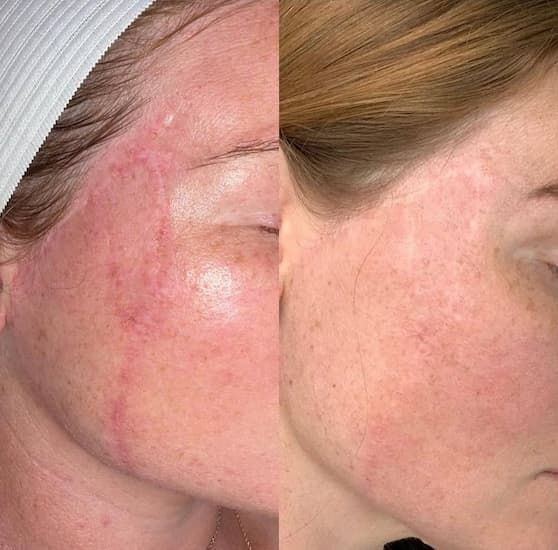
Scar Treatment Results from Microneedling
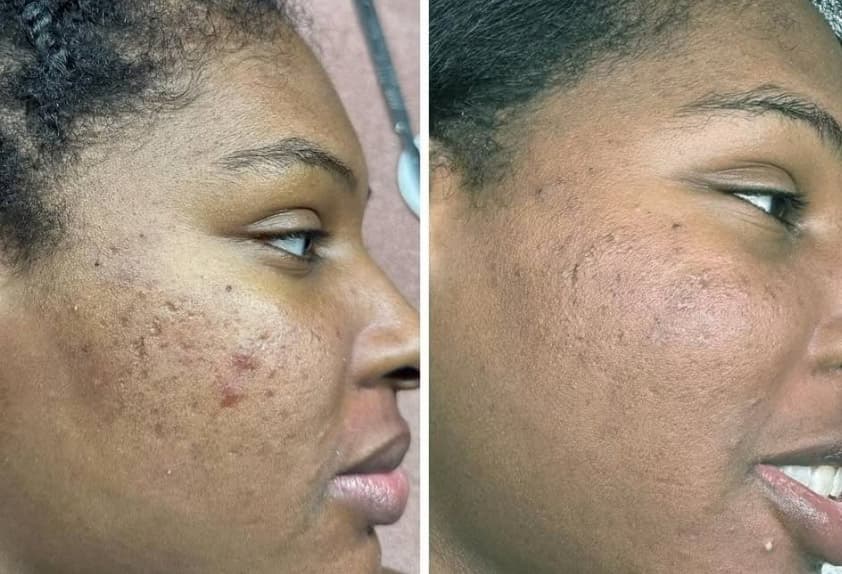
Texture Improvement Results
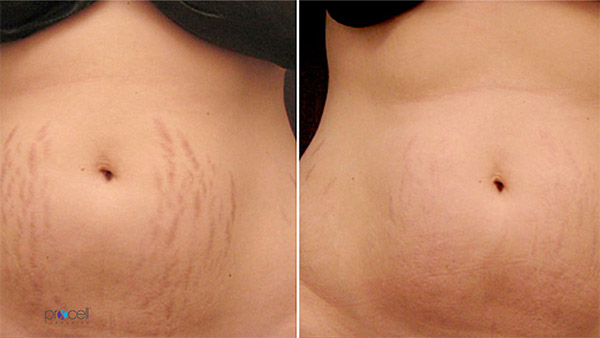
Skin Tightening Results
Meet Erika — The Skin Witch
Erika has over 14 years of experience in advanced skincare and has worked alongside dermatology teams using lasers and high frequency devices. She takes an evidence-informed, personalized approach to microneedling and microchanneling in a private studio setting. Learn more →
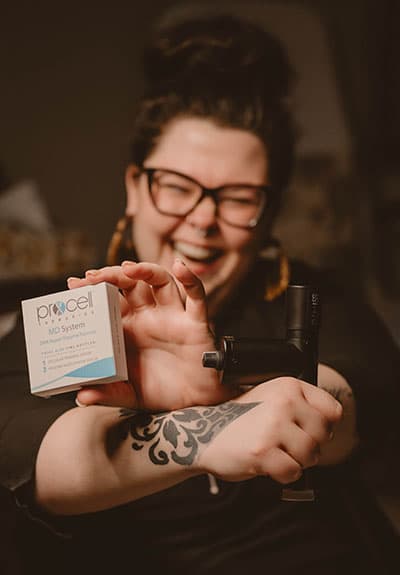
Erika with a Procell microchanneling device and MD serums
Consent & Photography
Informed consent is required for treatments. We request before/after photos only with client permission. Medical issues or suspicious lesions will be referred to a medical specialist prior to elective treatment.
Book Microneedling in Windsor & Contact
Ready to book your microneedling or microchanneling treatment or have a question? You may view our other Services here, schedule online through our Booking page or Contact us.
Please note treatment areas in booking notes so we can allocate appropriate time.
References & Further Reading
- Procell Therapies — Discover the Advanced Benefits of Procell over PRP (Procell blog)
- Jaiswal S., 2024 — "Microneedling in Dermatology: A Comprehensive Review" (PMC)
- Sim J. et al., 2022 — "Enhanced Micro-Channeling System via Dissolving Microneedle..." (PMC)
- Gupta M. et al., 2021 — Comparative study: microneedling combinations
- Phoebe LKW et al., 2024 — "Use of platelet rich plasma for skin rejuvenation" (PMC review)
- Procell Therapies — Newly Formulated Growth Factor Serums (2025)